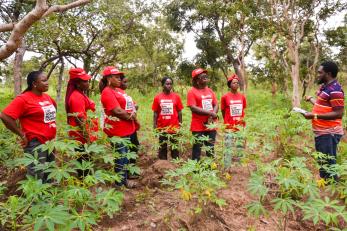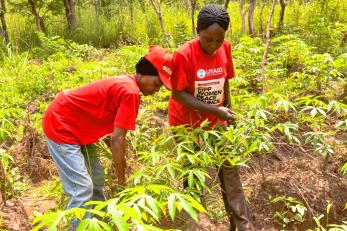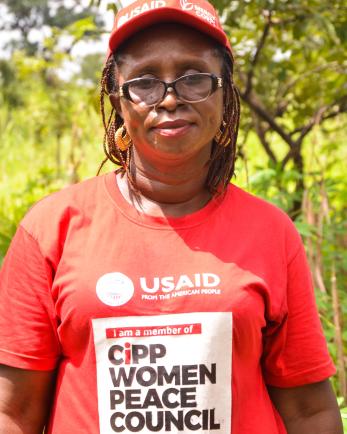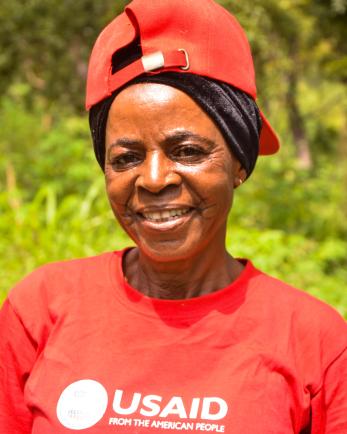Connecting communities with livelihood support for sustained peacebuilding

Residents of many implementing communities in Benue State have experienced a decline in purchasing power and financial security due to displacement, insecurity, and increasing economic hardship. This limits their ability to fully commit and participate in peacebuilding activities.
To address this, the USAID-funded Community Initiatives to Promote Peace (CIPP) Activity has made efforts to link its participants in its six implementing states (Benue, Kaduna, Kano, Katsina, Kogi, and Plateau) with opportunities provided by other Civil Society Organizations (CSOs) and International Non-Governmental Organizations (NGOs) with a mandate to provide livelihood support.
In 2021, CIPP implementing partner ARDA supported members of the Obagaji Women’s Critical Discussion Group (WCDG) in Agatu LGA to secure a grant worth 30,000CAD (23,494USD) from the Canada Funds for Local Initiatives (CFLI). This funding helped the group purchase a rice milling machine and receive financial literacy training. Proceeds from the use of the machine by them and other farmers in the community has increased their income, earning as high as 8,000NGN (20USD) a day. This has allowed the WCDG to reach over 200 community members with peacebuilding messages through their self-facilitated community peace events.

More recently, CIPP linked 653 members of its structures in Benue State with the unconditional small grants provided by the USAID-funded Feed the Future Nigeria Rural Resilience Activity (RRA). The Rural Resilience Activity, implemented by Mercy Corps, provided the support under the COVID-19 mitigation response program to prevent further decline and economic devastation of participants due to the secondary impacts of COVID-19 shocks and stresses.
Recipients of the RRA grant were pulled from members of various CIPP structures like the Women Critical Discussion Group (WCDG), Women Peacebuilding Council (WPC), Community Peace Observers (CPOs), and trained mediators who received unconditional cash grants worth 78,000 NGN (191USD) in March 2022.
Ten recipients who are members of the WPC of Guma LGA saw an opportunity to maximize the impact of the grant and pooled their money together to purchase a farm in Makurdi LGA. The women obtained about one hectare of land in Kandeor community that accommodates up to 100 lines of cassava mounds. Farm operations are managed by a member of the group who monitors and provides a report to the larger team.

Among other things, the farm was set up to provide a source of economic empowerment for the WPC members and support the sustainability of their peacebuilding initiatives beyond CIPP.

She further shared that in the long term, when the produce of the farm is harvested and proceeds are sold, it will provide them and other women in the community, with much-needed economic empowerment. This will better position them to contribute to the overall development and peace building process of their communities.
In a random sampling of 21 recipients of the grant from the four CIPP LGAs, 19 recipients channeled the grants into various business ventures. This highlights the importance of financial security and economic empowerment to the full commitment of community residents to the participation and sustainability of peacebuilding activities.
While the provision of livelihood support is not a mandate of the CIPP program, it is making deliberate efforts to link participants with available opportunities to provide economic empowerment.
About CIPP
Mercy Corps is implementing the Community Initiatives to Promote Peace (CIPP), a five-year peacebuilding program funded by United States Agency for International Development (USAID).
CIPP’s aim is to prevent violent conflict in the most at-risk communities across Katsina, Kaduna, Plateau, Kogi, Kano and Benue states in Nigeria’s North-West and Middle Belt regions. CIPP works with community leaders, women, government officials and state-level actors to improve their ability to peacefully manage disputes. CIPP also works to strengthen Early Warning and Early Response (EWER) mechanisms for timely response to violent conflict, and facilitate collaboration among communities with government agencies, civil service organizations and local leaders to address root causes of conflict.
CIPP is implemented in partnership with Pastoral Resolve (PARE), Interfaith Mediation Centre (IMC), Savannah Centre for Diplomacy, Democracy and Development (SCDDD), and the African Radio Drama Association (ARDA).